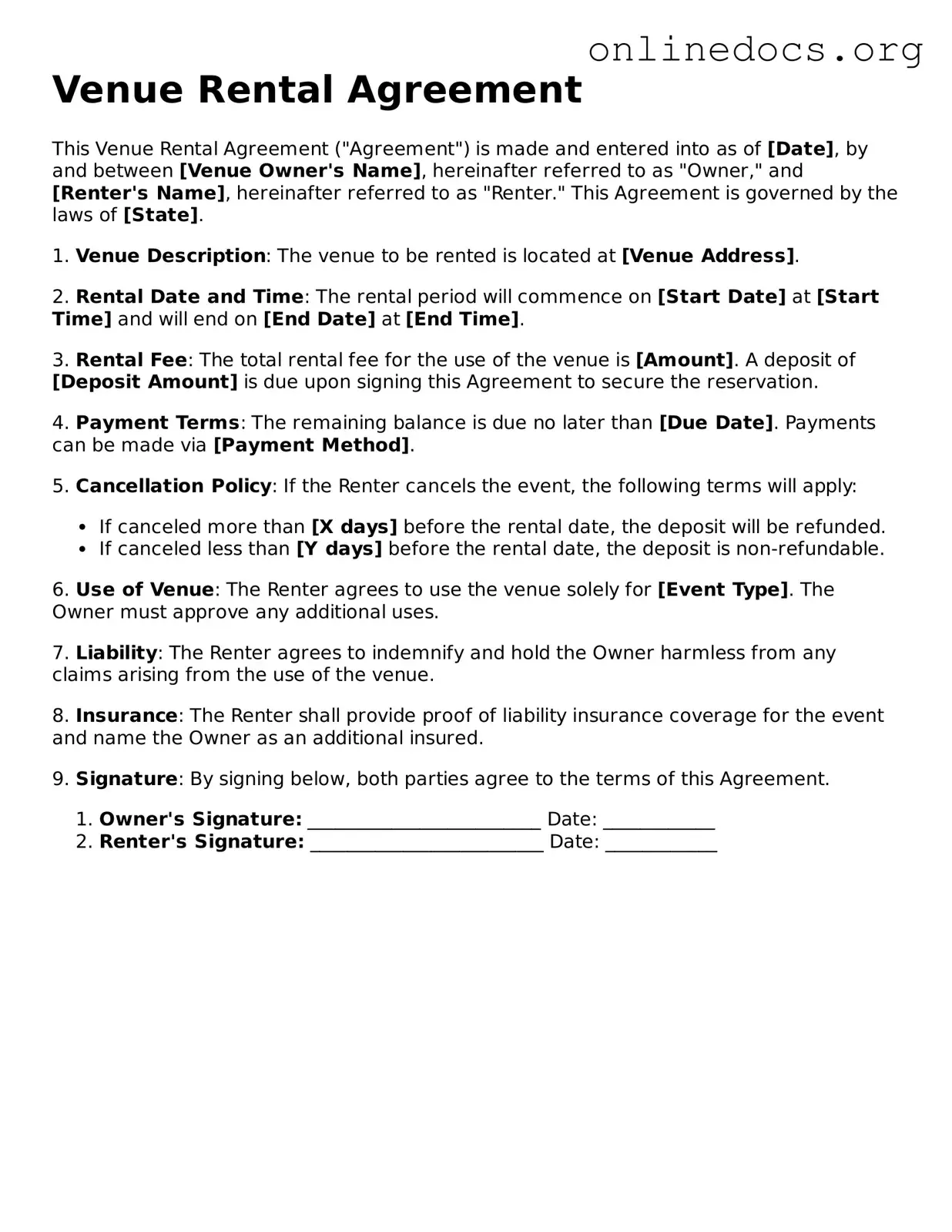The Event Space Rental Agreement is similar to the Venue Rental Agreement as both documents outline the terms and conditions for renting a specific location for an event. They typically include details such as rental fees, duration of use, and any restrictions on the use of the space. Both agreements aim to protect the interests of the venue owner and the renter by clearly defining expectations and responsibilities.
The Catering Agreement shares similarities with the Venue Rental Agreement in that it specifies the terms under which food and beverage services will be provided at an event. This document includes information about menu selections, pricing, and service times. Like the Venue Rental Agreement, it helps ensure that both parties understand their obligations and the services to be delivered.
A Lease Agreement for commercial properties is another document that resembles the Venue Rental Agreement. Both agreements involve the rental of a space for a specified period, detailing the rights and responsibilities of the landlord and tenant. While a Lease Agreement is typically more comprehensive, focusing on long-term occupancy, the Venue Rental Agreement is often more concise, focusing on short-term events.
The Equipment Rental Agreement is akin to the Venue Rental Agreement in that it governs the rental of items needed for an event, such as audio-visual equipment or furniture. This document outlines the terms of use, rental fees, and responsibilities for maintenance and return. Both agreements serve to clarify the expectations of the parties involved in the rental process.
The Service Agreement for event planning is similar to the Venue Rental Agreement as it establishes the terms under which an event planner will provide services for an event. It typically includes details about the scope of work, payment terms, and cancellation policies. Both documents aim to ensure that all parties have a clear understanding of their roles and responsibilities during the event planning process.
The Wedding Venue Agreement is closely related to the Venue Rental Agreement, as it specifically addresses the rental of a location for wedding ceremonies and receptions. It includes terms that may be unique to weddings, such as decor restrictions and coordination with other vendors. Both agreements prioritize clarity and mutual understanding between the venue owner and the couple planning their special day.
The Party Rental Agreement is another document that shares characteristics with the Venue Rental Agreement. This document typically governs the rental of spaces for parties, detailing the rental duration, fees, and any rules regarding the use of the space. Both agreements are designed to protect the interests of the venue and the renter, ensuring a smooth event experience.
The Film Location Agreement is similar to the Venue Rental Agreement in that it pertains to the use of a specific location for filming purposes. This document outlines terms such as rental fees, duration, and any necessary permits. Both agreements aim to establish clear guidelines for the use of the space while protecting the rights of the property owner and the production team.
In addition to the documents already mentioned, it is important to consider the Lease Agreement, which is another essential form in rental arrangements. This agreement outlines the specific terms under which property is rented, ensuring that both landlords and tenants are clear on their obligations and rights. For those interested in a comprehensive guide, more information can be found at https://azformsonline.com/lease-agreement, highlighting key elements of the lease process and helping to facilitate successful rental experiences.
The Conference Room Rental Agreement is akin to the Venue Rental Agreement, focusing on the rental of space for meetings or conferences. It includes details such as rental fees, duration, and amenities provided. Both agreements serve to clarify the expectations of the parties involved and ensure that the space meets the needs of the event.
Lastly, the Non-Profit Event Agreement is similar to the Venue Rental Agreement as it outlines the terms for hosting an event for a charitable cause. This document may include special considerations, such as discounted rates or donation agreements. Both agreements emphasize the importance of clear communication and mutual understanding to facilitate successful events.
